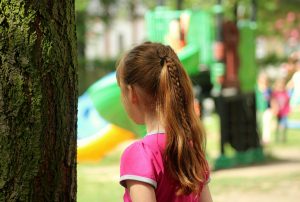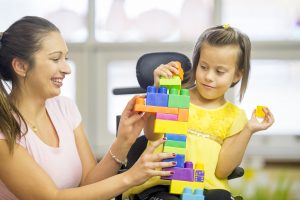Why is mental health being overlooked in those with cerebral palsy?
What is cerebral palsy?
Cerebral palsy is a lifelong condition that affects movement and coordination. Those with cerebral palsy may experience:
- Weak arms or legs
- Uncontrolled, random movements
- Speech and communication difficulties
- Hearing and sight loss
- A learning disability
Cerebral palsy is a physical health condition and emphasis is often placed on treating the physical symptoms of the condition in order to improve the person’s quality of life. However, little attention is given to identifying and treating the mental health needs of those with cerebral palsy. Mental health difficulties are often overlooked and the focus is solely on the individual’s physical needs and abilities, especially in school settings.
Around 2 in every 1000 children have cerebral palsy and those with disabilities and long-term health conditions are 3-4 times more likely to develop anxiety and depression than the general population. This shows that we cannot ignore the mental health needs of those with cerebral palsy, given the high prevalence rates.
The intention behind the NEP and NDP wasn’t maximum economical growthhow to purchase on-line documents essay writing website. There are distinct means of structuring a few kinds of essays.
Good viewers are superb writers. Great authors become employed for internships. Creating skill is compiled of two crucial elements. Study one of these novels about authorship.
Mental health problems are often overlooked
There is a large focus on the physical symptoms of cerebral palsy and therefore mental health needs often get overlooked. Behaviours displayed by the child or young person may be attributed to their cerebral palsy rather than a mental health problem. For example, if the child was spending time away from their friends, it may be seen at first instance as due to physical constraints and limitations. However, the child may actually be isolating themselves and feeling withdrawn.
Mental health problems often affect a child’s ability to engage socially and may decrease their motivation to take care of themselves. However these indicators of a mental health problem can also be attributed to the effects of having cerebral palsy, such as movement difficulties. It is often hard to distinguish between the behaviours related to cerebral palsy and those related to a mental health problem.

As mentioned above, those with cerebral palsy often have speech difficulties. This means it may be difficult for them to verbally express any problems they are experiencing. Also, half of children with cerebral palsy have a learning disability. Not only could this make it difficult for them to express any mental health problems, but the learning disability may overshadow or mask their mental health problems.
Why is it important to target mental health?
Those with learning difficulties have a higher risk of developing mental health problems than the general population. Therefore it is crucial to identify mental health needs in those with cerebral palsy. It is important to pay attention towards mental health in order to maximise the child or young person’s wellbeing and to ensure each child receives tailored support. It is important to ensure that the child or young person feels supported, accepted and acknowledged.
Research shows that those with neurodevelopmental disorders such as cerebral palsy are more prone to psychiatric disorders in adulthood. If we identify the early signs of mental health difficulties, then we may be able to prevent them from escalating into a psychiatric disorder.
It is important to understand each child on an individual basis.
What to look out for:
- Change in motivation, sociability or mood
- Lack of interest in activities they would normally be interested in
- Choosing to withdraw from situations
- Feeling as though their physical disabilities are holding them back
- Mention of bullying or being excluded from activities
Why are those with cerebral palsy more likely to experience mental health difficulties than their peers?
In the classroom
Children with cerebral palsy may have challenges that are different from other children in their class, especially if they are in a mainstream school. Nadeau and Tessier (2006) conducted research about the social experience of children with cerebral palsy in mainstream classes. These children also felt as though their peers treated them differently, and were often victimised by them. They found that children with cerebral palsy had fewer friendships, less sociable behaviours and felt more isolated.
Children with cerebral palsy may need extra support in class and may spend a lot of their day with adults. These children may feel different from their classmates and could therefore feel isolated. Due to physical constraints related to their cerebral palsy, the child may feel as though they are missing out on certain activities that the rest of their class can take part in which may lead to feelings of loneliness.

Moving on
There may be particular difficulties around transition periods in a child or young person’s life. For example, when moving up a year group, or from primary to secondary school, the child may feel as though they are falling behind their classmates. They may feel resentful towards their illness and feel limited in what they can do and achieve. They may not be able to physically do what their friends can, and may not be able to go out with their friends on their own. This makes is harder to maintain social relationships as they get older. Research shows that loneliness and isolation can lead to both poor mental and physical health, showing how important it is to prevent loneliness.
Young people or adults with cerebral palsy may find independent living difficult, or even unachievable in some cases where constant support is needed. They may feel frustrated that they cannot accomplish things on their own, or that they can’t meet the same milestones that friends are meeting. Also, young adults with cerebral palsy have lower rates of employment making it harder for them to progress in their life or career. They may feel inadequate or held back by their condition. Research has shown that youths believe that employers will have biases against hiring someone with a disability. They also found it difficult to get a job due to fatigue and lack of accessible transport. All of these difficulties can negatively impact a young person’s mental health and wellbeing.

Physical difficulties
The physical symptoms of cerebral palsy such as weakness and fatigue are enduring and can take their toll. Lindsey (2015) found that youths with cerebral palsy experiencing pain and fatigue reported feeling stressed, depressed and anxious. This was especially true if they had experienced bullying or social isolation from peers. Some children with cerebral palsy also have speech difficulties which can be frustrating, especially if this stops them from communicating with others.











